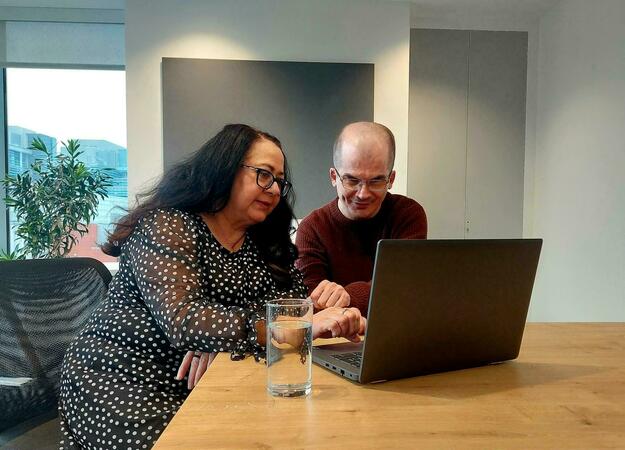9 things our counsellors want you to know

What do you picture when you imagine someone having counselling?
It’s fair to say we’ve come a long way from the stereotypes of someone lying on a couch and medical-looking white coats… But how much do you really know about counselling - and could your preconceived ideas be putting you off getting professional help?
We asked the LionHeart counsellors what they really wanted you to know about counselling - and about LionHeart’s counselling service in particular. Here they are, in no particular order…
It’s all about *you*
Talking about how you feel and having a safe space to explore that is incredibly powerful. People often choose to speak to a counsellor because they feel they will benefit from support from a professional with an objective viewpoint. It’s different to talking to a close friend or loved one because - to be perfectly frank - you don’t have the added complexity of worrying whether what you say will upset or offend them. Counselling is *your* space.
You don’t have to be at ‘rock bottom’
One of the misconceptions we hear most frequently is that people think they need to be at breaking point to ask for counselling. In fact, our counsellors would much rather you picked up the phone earlier on. The sooner someone gets support, the sooner they might be able to find a way forward.
There are different kinds of counselling
There are many different kinds of talking therapies/ counselling. At LionHeart, our professional counsellors are registered and/or accredited by the BACP or BABCP to ensure the highest standards of service. We use an integrative counselling approach depending on the client and their issues. This might include person-centred counselling, CBT (cognitive behavioural therapy) and EMDR (eye movement desensitisation and reprocessing, particularly useful for post traumatic stress disorder or following trauma)
Counsellors don’t “tell you what to do”
Counselling isn’t about telling a client what they need to do. Instead, counselling aims to allow someone to explore their own thoughts, encourages self-awareness and reflection, and helps people to have a greater understanding of themselves and their reactions.
Low waiting lists - plus support while you wait
The very long waiting lists to access NHS support are well-documented in the media. Some of the clients we have helped recently had been told they faced waiting well over 12 months; some even longer. At LionHeart we are proud to keep our counselling lists comparatively low and aim for you to be talking to your professional counsellor within weeks. Best of all, because we know it’s hard to be sent away to wait when you’ve been brave enough to ask for help, one of our experienced support officers will be in regular touch throughout, to explore any other ways we might be able to offer help in the meantime.
There’s support for your family
Counselling has become one of our most requested services for RICS professionals in recent years. But did you know that your spouse or life partner can also access our support? And we can also offer swift access to specialist youth counselling in the UK if your child is aged 12 to 18.
We get that it can place the whole family unit under great strain if one member is struggling. It can also be really hard to figure out the systems for accessing support, so we try to make it as easy as possible.
It's completely confidential
What you say to a professional counsellor is completely confidential and stays between you and your counsellor. The only circumstance where that might differ is if you disclose information about risk of harm to yourself or others, which may lead to your counsellor needing to take safeguarding action. This would usually be discussed with you first.
Sometimes people are reluctant to access counselling that may be available through their employer via an Employee Assistance Programme because they worry about personal information could be shared. As a wholly independent charity, LionHeart does not share any information with RICS or any employers. In fact, we don’t even record who you work for.
This independence also allows us flexibility in the number of counselling sessions we can offer, unlike most NHS or EAP services - we usually offer up to 10 sessions, although this may be extended if there is thought to be a clinical need.
The reasons for having counselling are hugely varied
Why do people seek counselling? The reasons are as varied as people themselves.
Common things we help people work through, though, include grief/bereavement or relationship breakdown, stress and anxiety, childhood trauma or family issues, and mental health conditions such as OCD or social anxiety. We have seen an increasing number of surveyors who have received a diagnosis of autism or ADHD as an adult, and many people who are experiencing difficulties in the workplace.
Sometimes, counselling isn’t suitable
There are occasions when counselling isn’t suitable for someone who calls us. We may be unable to progress with formal counselling sessions if someone is already under the care of another therapist or psychiatrist, or is facing upcoming or potentially upcoming court cases which could require session information to be disclosed under court order. Occasionally there may be cases that would be better suited to more specialist help.
We would still encourage people to make contact with LionHeart whatever their circumstances, though, as the support we can offer is wide-ranging and our experienced support officers are always happy to explore every avenue.
Find out more:
Watch below as our ambassador Jordanne shares her experience of having counselling through LionHeart:

